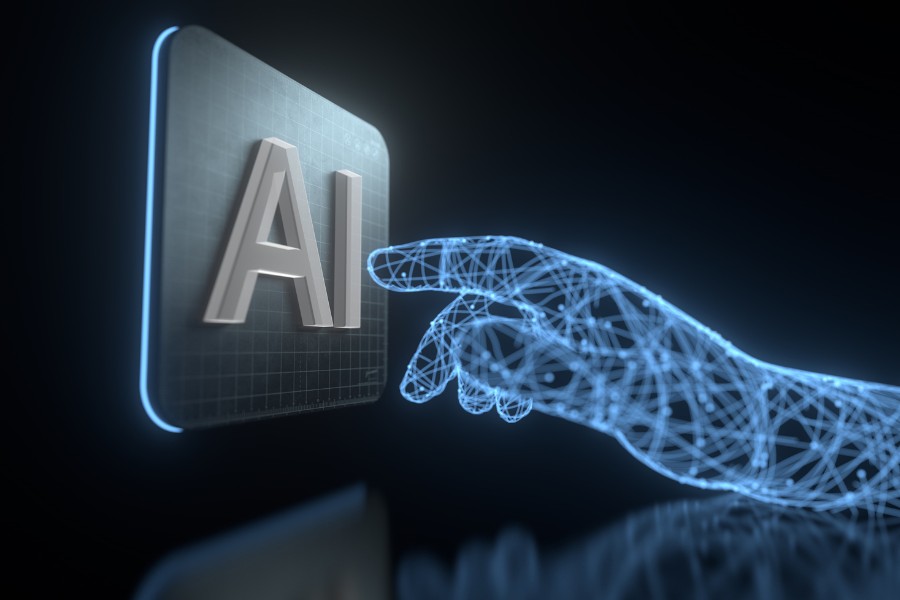The rise of artificial intelligence (AI) has revolutionized how many businesses operate, leaving many unanswered questions about its impact in the workplace. AI has led to unprecedented technological advancements and automation. However, there are concerns about job displacement and privacy.
Today, talent acquisition professionals face the challenge of leveraging AI ethically to attract and recruit top talent. In the comprehensive guide, “AI in TA: Navigating a New Wave of Technology in a Human-Centric Profession,” RippleMatch dives into the critical questions surrounding AI history, application, safety and guidelines.
With a focus on Gen Z recruitment strategies and the potential of campus recruitment, this article will serves as a roadmap for talent professionals to harness the power of AI while making sure it enhances, rather than overshadows, the human touch that is crucial in the recruitment process. Plus, we’ll share best practices for AI safety and showcase real-world examples of AI audits. As we lean into 2024, check out the highlights below and download the full report to go into the new year with a strategy that embraces AI in a human-centric way.
The AI Landscape: Where are we now?
- Artificial Intelligence (AI) has been studied academically since the 1950s, but recent advancements in computers and the internet have brought AI to the forefront.
- AI systems have the ability to learn and improve on their own, making tasks faster and more efficient.
- AI technologies like Natural Language Processing (NLP), Deep Learning and Machine Learning (ML) are enhancing everyday products and services.
- Examples of AI in everyday life include voice assistants, entertainment recommendations, translation apps, e-commerce recommendations, smart home devices, customer support bots and AI-powered job recommendations.
- AI is also making an impact in mobility and logistics, with self-driving cars and ride-sharing apps utilizing AI for route optimization and automation.
Striking the Right Balance With AI in Recruitment
- AI can be a powerful ally for talent acquisition professionals, automating administrative tasks and expanding reach, freeing up recruiters to focus on authentic human elements of the job.
- AI tools assist in crafting job descriptions, strategizing employer brand messaging, and generating employer branding material.
- AI sourcing tools actively scan professional networks to identify and reach out to potential candidates, building a talent pool.
- When considering AI recruitment tools, transparency, diverse data, third-party validation, vendor responsibility, compliance assurance, human oversight and ethical considerations should be taken into account.
AI in Early Career Recruitment
- The traditional playbook of early career recruitment, which relied heavily on-campus recruitment, was disrupted by the COVID-19 pandemic, leading to a shift toward virtual recruitment strategies.
- Virtual recruitment has many benefits, including a more diverse pool of candidates, decreased costs and increased flexibility for interviews and opportunity discovery.
- AI tools like RippleMatch result in a 70% reduction in time spent reviewing resumes, a 90% more diverse pipeline, and cut down the applicant review time to just five days.
- Campus recruitment teams can use AI to redefine their strategies and make them more efficient, equitable and enjoyable through AI-powered platforms. AI helps automate sourcing and applicant review, allowing recruiters to focus on the best-fit candidates and prioritize response times, even for virtual and in-person events like career fairs.
Choosing Ethical AI: AI Safety
- President Biden’s Executive Order highlights the importance of safe and trustworthy AI, emphasizing the need for rigorous evaluation of AI vendors.
- Buyers should look for vendors that have concrete measures and a proven track record in upholding principles of privacy protection, bias mitigation, compliance and certification, security measures, transparency and accountability.
- RippleMatch, an AI-native company in recruitment, prioritizes safety and trustworthiness and adheres to high standards of AI ethics and safety.
Key Takeaways for Integrating AI Into Your Team’s Workstream
- Map out the recruitment process to identify tasks suitable for AI automation, such as candidate sourcing and initial communications, to free recruiters for personalized engagement and strategic planning.
- Evaluate AI vendors based on their measurable results and depth of capabilities, including analytics, system integration, continuous learning and improvement.
- Maintain a balance between AI-driven data insights and human judgment to ensure AI is always supporting, rather than replacing, the human elements of recruiting, such as cultural fit assessments and relationship-building.
- Utilize AI-driven platforms for campus recruitment to analyze historical data, prioritize on-campus presence, and manage follow-up communications effectively. Additionally, use AI tools that prioritize diversity, equity, inclusion, and bias checks.
- Stay updated on the evolving legal and ethical considerations of AI in recruitment to ensure compliance and respect for candidates’ privacy and rights.
Conclusion
The integration of AI in recruitment is inevitable. And luckily, it is poised to revolutionize the hiring process, making it more efficient and effective for recruiters and candidates alike. However, with this new technology comes responsibility and a need for a thorough evaluation of AI vendors.
For more in-depth details on how to implement AI into your recruitment strategy, get your free copy of the AI in TA: Navigating a New Wave of Technology in a Human-Centric Profession guide.
Before developing your early talent strategy for 2024, be sure you have the right knowledge and tools to effectively engage with the future of our workforce.
Authors
Kate Beckman
Kate Beckman leads community engagement and talent insights at RippleMatch, a comprehensive platform for early career hiring. In her role at RippleMatch, Kate facilitates conversations and community among talent acquisition and campus recruiting leaders and publishes data-driven insights on the next generation of talent. Prior to her role at RippleMatch, Kate was the founder and Editor of a national online publication for college students, an expert speaker on Gen Z consumers, and a writer for Cosmopolitan's 'Careers' vertical.
Recruit Smarter
Weekly news and industry insights delivered straight to your inbox.





